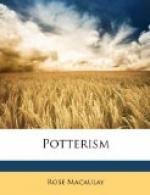’DIVORCE OF A PEERESS.
‘MURDER OF BRITISH JOURNALIST IN RUSSIA-LATE WIRE FROM GATWICK.’
They bought the paper, to see who the British journalist was. His murder was in a little paragraph on the front page.
‘Mr. Arthur Gideon, a well-known British journalist’ ... first beaten nearly to death by White soldiery, because he was, entirely in vain, defending some poor Jewish family from their wrath ... then found by Bolshevists and disposed of ... somehow ... because he was an Englishman....
7
A placard for the press. A placard for the Potter press. Had he thought of that at the last, and died in the bitterness of that paradox? Murdered by both sides, being of neither, but merely a seeker after fact. Killed in the quest for truth and the war against verbiage and cant, and, in the end, a placard for the press which hated the one and lived by the other. Had he thought of that as he broke under the last strain of pain? Or, merely, ’These damned brutes. White or Red, there’s nothing to choose ... nothing to choose ...’
Anyhow, it was over, that quest of his, and nothing remained but the placard which coupled his defeat with the peeress’s divorce.
Arthur Gideon had gone under, but the Potter press, the flaunting banner of the great sentimental public, remained. It would always remain, so long as the great sentimental public were what they were.
8
Little remains to add. Little of Gideon, for they never learnt much more of his death than was telegraphed in that first message. His father, going out to the scene of his death, may have heard more; if he did, he never revealed it to any one. Not only Arthur had perished, but the Jewish family he was trying to defend; he had failed as well as died. Failed utterly, every way; gone under and finished, he and his pedantry and his exactitude, his preaching, his hard clarity, and his bewildered bitterness against a world vulgar and soft-headed beyond his understanding.
Juke refused St. Anne’s, with its chances, its congregations, and its scope. Neither did he preach at Sandringham. Gideon’s fate pilloried on that placard had stabbed through him and cut him, sick and angry, from his moorings. He spoke no more and wrote no more to admiring audiences who hung on his words and took his quick points as he made them. To be one with other men, he learnt a manual trade, and made shoes in Bermondsey, and preached in the streets to men who did not, as a rule, listen.
Jane would, no doubt, fulfil herself in the course of time, make an adequate figure in the world she loved, and suck therefrom no small advantage. She had loved Arthur Gideon; but what Lady Pinkerton and Clare would call her ‘heart’ was not of the kind which would, as these two would doubtless put it in their strange phraseology, ‘break.’ Somehow, after all, Jane would have her good time; if not in one way, then in another.




